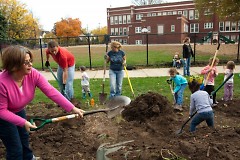Here in Grand Rapids, and extending throughout West Michigan, we’re known for our many nonprofit organizations and our culture of philanthropy. From services for those in need, to organizations that support the arts, from nonprofits that provide educational opportunities, to small groups that work in our neighborhoods, there are a wide range of nonprofits doing good in our community.
“Some people argue it’s largely driven by faith or religion, but I think the culture, while it may be heavily influenced by that, goes beyond that,” said Salvatore Alaimo, PhD, Associate Professor at the School of Public, Nonprofit and Health Administration at Grand Valley State University.
“There’s something about West Michigan…people understand the importance of giving to each other, and how we all benefit as a community when we give, individually or collectively.”
As the nonprofit sector in our region continues to grow, nonprofits have to transition to more sustainable practices – in their operations, financially, and beyond.
“There as so many factors that drive this issue, internally and externally. Do we have an effective working board that understands their role, and the three duties of care, obedience, and loyalty in the governance piece?” said Alaimo said.
“My clients who are closely held businesses need a business succession plan, and it’s the same thing with the nonprofit sector. What happens in the event that a key decision maker in a nonprofit retires, is disabled, or passes away?” said Jeshua Lauka, Business Attorney at David & Wierenga, P.C.
Lauka also mentions engaging millennials as a key factor in nonprofit sustainability. Alaimo notes that stability and sustainability need to be balanced, through a healthy volunteer pool, a professional paid staff, and collaboration on all sides.
“Funders are always hammering nonprofits to collaborate, but I don’t hear them collaborating. They’re the ones holding the resources, and nonprofits need the resources.” Alaimo said.
Financial sustainability is always a concern for nonprofits, with an aging donor population and tough competition for grant funding. It’s also a common misconception that nonprofits are funded through taxes, or by the government.
“People do not understand that individual donations are the primary source of funds that nonprofits rely on,” said John Potter, Executive Director of Grand Rapids Area Professionals for Excellence (GRAPE).
When GRAPE was formed, Potter initially intended to designate the organization as an LLC. However, once he decided to apply for the nonprofit 501(c)3 tax status instead, he noticed that both the support for GRAPE’s work and the volunteer base increased.
“Volunteers almost have a life cycle of interest. You want to make sure that they feel that they’re being appreciated, that what they’re doing is worthwhile,” said Potter. “But they do impact the bottom line.”
We’ve also been hearing more about B Corps, or Benefit Corporations, in the news. Maryland was the first state to enact B Corp legislation in 2010. Today, B Corp legislation has passed in 31 states. While Michigan law does not currently allow for the legal formation of B Corps, businesses and organizations can become a certified B Corp through the nonprofit B Lab. The interest in this business model is one of the results of the shifting culture of philanthropy and social entrepreneurship in West Michigan.
“Particularly millennials, and those that have recently joined the workforce, really want to join organizations that are purpose driven. [They want to feel] that their companies exist for a benefit, to do some social good.” said Lauka.
While there are challenges to nonprofit work and the issue of sustaining these organizations, Potter notes that nonprofit work is very rewarding, whether you’re a nonprofit professional, volunteer, or donor.
“For anyone who wants to serve in this community, there are an abundance of resources for doing that,” said Lauka. “It’s just a matter of showing up.”
Watch and listen to the full discussion on Nonprofit Sustainability above in GRTV’s recent episode of Focus on Issues, or catch it airing on GRTV.
The Rapidian, a program of the 501(c)3 nonprofit Community Media Center, relies on the community’s support to help cover the cost of training reporters and publishing content.
We need your help.
If each of our readers and content creators who values this community platform help support its creation and maintenance, The Rapidian can continue to educate and facilitate a conversation around issues for years to come.
Please support The Rapidian and make a contribution today.


